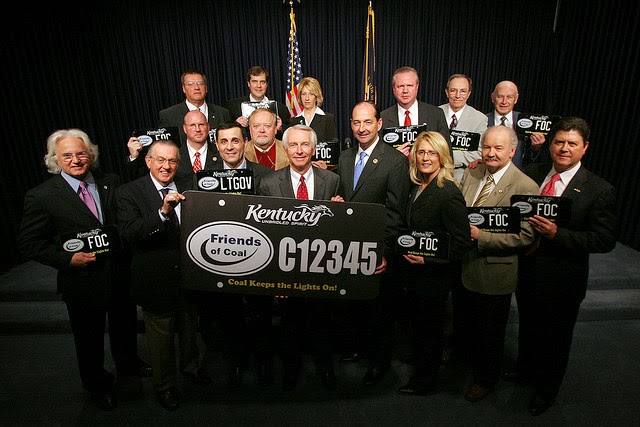A while ago I decided to do some investigating on who or what “Friends of Coal” was. What I found surprised me (well… not really).
Friends of Coal wasn’t a group of coal miners and their families working to help one another during hard times. It was the coal operators. At first glance, their website states they are “a volunteer group of West Virginians and residents from beyond our borders,” but their address is the same as the West Virginia Coal Association, an organization of coal companies and their suppliers.
I found all of this out by going to the West Virginia Coal Association‘s website where I looked around until I found their membership roster.
Look for yourself:
West Virginia Coal Association
Think of coal associations sort of like a union for the coal companies. In fact, the Kentucky Coal Association states on their website, “KCA traces its origin to a statewide association of coal operators who united their efforts in 1942.” Companies pay their dues (and more) and the association uses that money to pay full-time lobbyists in state capitals and Washington DC to get what the coal companies want. They support political campaigns and even send representatives to argue against new safety laws, black lung benefits legislation, and protections for people living near their operations that would cost their members more money.
So what does this mean?
It means that if you are supporting Friends of Coal, you are not supporting coal miners and their families, you are supporting the coal companies and their interests. At first you might think that it’s a good thing to support the coal companies because they create jobs and help coal mining communities, right? Well, not exactly. Here are some things to consider before lending them your support.
1. Coal companies aren’t creating jobs, they are killing them.

Coal companies are constantly seeking to reduce labor overhead. The first and best way to do this is through mechanizing their operations, or, in other words, buying bigger or more complex machines to do the work and reduce the number of miners they have to hire. This explains how and why coal production has reached record highs while coal mining employment has been in a near constant decline. It’s kinda funny though. Some of the biggest supporters/contributors to coal associations (and Friends of Coal) are equipment manufacturers. Go figure.
While mechanization is perhaps the biggest contributor to reductions in coal mining employment, the companies have their other methods as well, such as making employees work mandatory overtime or hiring temp laborers to avoid paying for healthcare benefits. Let’s say for instance they get two miners to work 60 hour a week. Yes, they are paying them time and a half for the extra 20 hours each, but between the two of them that’s 40 hours, or another man’s job they are doing. Since the company doesn’t have to hire the extra position, all they have to pay is the extra wage while not having to pay for an extra miner’s healthcare benefits, 401k matching, workman’s compensation, etc. The two miners might enjoy the extra money they are receiving, but they are spending less time with their families and more time breathing dust each week. And if you’re a coal miner looking for a job, it means you and your family are obviously getting nothing because you are unemployed.
2. Coal Companies fight for their profits, not for the coal miner’s well being. Safety costs money, and production. In order to be safe, miners have to take time to properly assess situations. They have to take time to install more roof bolts, properly position equipment, ensure ventilation is right, etc. Safety also requires additional equipment that must be purchased and maintained. It is also important to do proper maintenance on all of the machinery so that it remains in safe operating order. All of this comes at the expense of time and money for the company. This is why coal companies actively seek to block new safety legislation and reduce the effectiveness of existing laws. If you don’t believe me, continue reading.
In this article in the WV Gazette it was reported how the West Virginia Coal Association sat right across from the widow and infant son of a fallen coal miner, listened to her plea for them to adopt proximity detection systems on continuous miners that would save coal miner’s lives, only to have the West Virginia Coal Association vote against the proposal.
In this article on the WV Legislature website, the West Virginia Coal Association is called out for its support of bill that would gut mine safety legislation in the state, and here, the Vice President of the West Virginia Coal Association speaks against MSHA’s new rules that could end black lung. Their reason for objecting? Costs to the industry. Note this was going on in 2013 and now there has been a resurgence in black lung disease.
3. Coal associations are working to make sure our kids will mine their coal.
The coal associations, and the companies that comprise them, are not just about convincing coal miners they should support the industry right now, they are looking to the future as well. It says so in the the Friends of Coal Mission Statement: “By working together, we can provide good jobs and benefits for future generations, which will keep our children and grandchildren close to home.” How many of our parents honestly wanted us to go to work in the mines? Sure they want us to stay close to home, but I don’t think that’s part of the deal. This is a perfect example of how the coal companies studied and used our culture so they could adapt messaging that we’d support. As someone who is now studying public relations, I can tell you that was a slick, and effective move.
Nevertheless, coal companies have worked to influence our children at early ages through company funded school programs such as “Coal in the Classroom,” Coal Education Resources and Development (CEDAR), and with lesson plans that neglect to tell about many coal mine disasters and their causes, the bloody labor struggles against company hired mercenaries, and so on. They have even rewritten the history of early mining and coal camp life to sound better than sharecropping and working in northern factories.
4. Coal companies already have a lot of help. If you start digging around you’ll find out these company funded coal associations have well paid lobbyist who live and work full time in state capitals and in Washington DC. They also have lawyers on retainer (or in other words, full time lawyers), living and working in these places. There is even the Energy and Mineral Law Foundation, a vast organization of lawyers, law firms, and law schools dedicated to these industries. Take a look through their website and tell me how a poor coal miner or Appalachian land owner has a chance to win against these Goliaths? I also have to mention this one. In October 2013, in an investigation by ABC News, it was finally revealed that coal companies had been paying doctors at Johns Hopkins University to read x-rays for black lung claim appeals. The result—nearly all claims were denied.So, for the coal industry, printing stickers and selling license plated is simply icing on the cake. The extra public support ensures the politicians they’ve spent years pouring money into are continually voted back into office.
People must realize that coal companies and their organizations are not here for our benefit. Their primary goal is to make money for themselves and their shareholders who are living it up in other places. They achieve this by getting people to support and promote legislation that makes it easier for them to rip coal out of the ground no matter the cost to miners or the people living nearby.
If you spend a little time following the links I provided throughout this page and doing your own research you’ll find as I have that beneath the surface of the license plates and stickers, the banners and billboards, it’s all about the coal companies doing what they’ve always done—doing whatever they can to take the billions of dollars of coal out of the mountains as cheaply and profitably as possible. In turn, the people of Appalachia are left with broken backs, choked lungs, and no decent economy to speak of. And lets not forget the pain medication abuse running rampant among our youth, a lack of clean water, and badly damaged road infrastructure.
If we are to have any hope of raising our Appalachian home out of the crippling poverty and ill health that has plagued us for well over a century, we must start by realizing the cause and fighting to stop it.
I can tell you without any hesitation that supporting Friends of Coal is one of the worst things someone can do for coal miners and their families, and well, anyone else living in the coalfields.
Additional Reading:
A Coal Miner’s Health: Short Term Gains and Long Term loss

